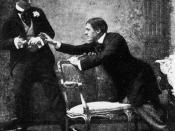Individuals in nineteenth century England were organized into social classes which were defined by occupation, family connections and access to wealth. Individuals generally remained within the class they were born into. At the top of the scale was the upper class, consisting of the aristocracy, the landed gentry and a select number of wealthy professionals and manufacturers. Then there was the middle class, represented by professionals, manufacturers, artists and retails. And after that there were the working classes, consisted of servants, trades people, retail workers and laborers. The poor and destitute existed outside this framework but remained visible and a significant source of anxiety.
The major theme of "Importance Of being Ernest" is the satire of the upper classes. This is a particularly appropriate theme for Oscar Wilde to choose because of his personal experience among upper class people in the Victorian society. Back in the 19th century, where hypocrisy, extravagance and fake aristocracy ruled the upper class society of England, Wilde used this play as a means of protest against this Social hypocrisy.
By using satirical devices such as irony, travesty and sarcasm, Wilde questioned the morals and values of the people of this so called high class society. He mocked this societies where a person is judges rather by his outer appearance, money, power and even by their name rather than their inner personality. We can as well say that the two lead male characters Ernest and Algernon were also two of the many victims of this social hypocrisy and thus they created a double life for themselves so that they could satisfy both this upper class society and also their personal desires. He also mocked the shallowness of the people that consisted these upper class societies through the obsession of Gwendolen and Cecily with the name Ernest.


